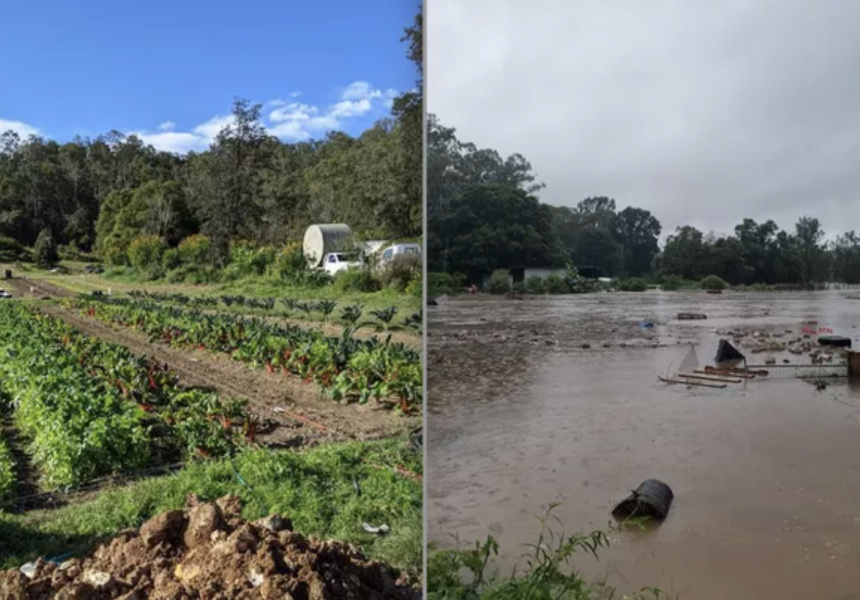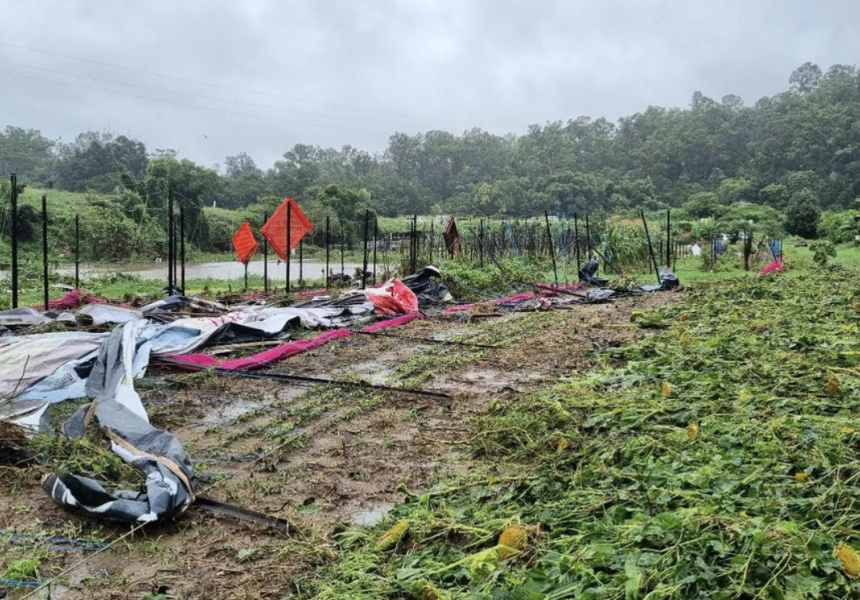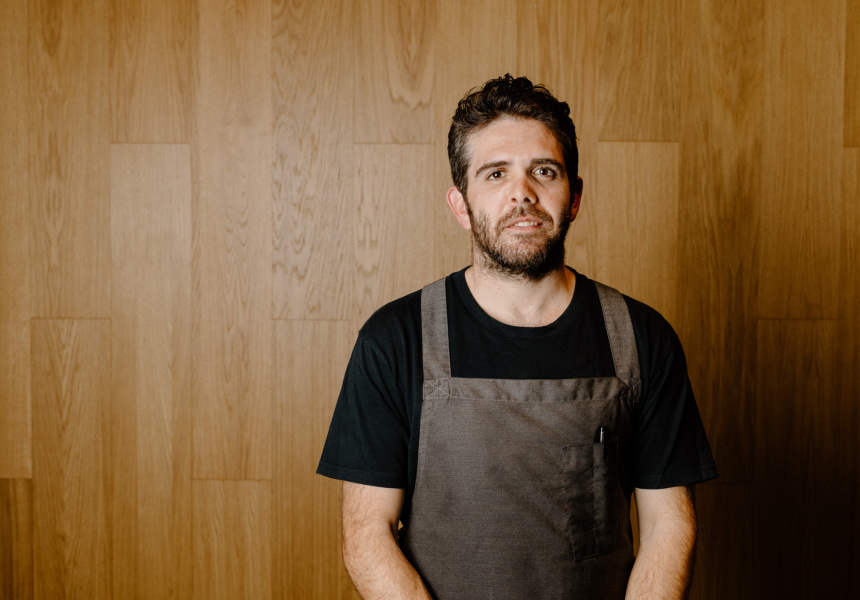“This was unlike anything we ever expected to see. It was just next level.”
Those are the disbelieving words of Alice Star, co-owner of Loop Growers.
Loop is just one of numerous small-producer farms in Brisbane and south-east Queensland that are reeling from the weekend’s floods, with some properties remaining partially underwater or at risk from further rain events. These are specialist farmers of unique and often organic produce, custom-grown for some of Brisbane’s best restaurants, meaning there are far-reaching ramifications for the city’s dining scene.
Never miss a Brisbane moment. Make sure you're subscribed to our newsletter today.
SUBSCRIBE NOWStar and her Loop co-owner Phil Garozzo’s 16-hectare property sits within a pocket of Cedar Creek, north-east of Samford Village. It supplies restaurants and cafes such as Essa, Elska, Florence, Grown, Pasta Club and Alphabet Cafe.
She says the water rose at a frightening pace on Friday, as the major weather system already affecting the Sunshine Coast moved south over Brisbane.
“On Friday, my partner Jules and I were in the barn at the top of the property, because it was so rainy we couldn’t really do anything in the garden,” she tells Broadsheet. “But I’d gone outside and I could see the very corner of our cultivated area, and it was just water.
“I said, ‘Let’s go for a drive,’ and I noticed the bank had broken further down and water had started flowing into the garden. I’d never seen it come through that quickly before, but it wasn’t anything too drastic at that point.
“I realised the goats were still in their pen … by the time we got into their pen, their hooves were under water. And by the time we had unclipped all 10 of them, the water was already up to their stomachs. It was flowing in so quickly.
“Looking back, it was actually quite disorienting, because you’re just reacting and responding in the moment. And by the end we were carrying or helping them swim to higher ground.”
The Loop team ended up hauling a bunch of equipment – including a walk-behind tractor – to higher ground, and used a ride-on tractor to pull two vehicles out of the flood waters.
“It was probably at about two metres at its deepest in the lowest part of the garden on Friday.”
But the rain continued, and over the following two days the water receded and rose again three times. It reached a peak on Sunday at what Star estimates was four metres deep at the lowest part of the garden.
“It was shocking,” she says. “It just didn’t stop, it just kept going up and up and up. I was up in the barn and one by one, I saw each of our buildings get crushed and float away.”
Despite efforts to secure it in-between flood surges, Loop’s shipping container swung around in the flood water and damaged the farm’s processing house. A caravan, used by interns as accommodation, now lies crumpled next to a tree. The biggest loss, though, was a seedling house.
“After the first three times that the water had gone up, all the seedlings were still there,” Star says. “So we had that hope that we were going to be able to rebuild the beds and put the seedlings in. But now we don’t even have any trays to grow the seedlings in, so that’s drastically changed the position we’re in.”
Loop lost much of its current crop, apart from some Jerusalem artichokes that it’s hoping to salvage. That includes all of its basil, okra, cucumber and parsley. But summer is usually a time to not have so much in the ground, hence the blow of losing the seedling house, which would’ve set the farm up for a bumper autumn season. Star’s sisters Jeannie and Billie Star have launched a Gofundme to provide financial support for Loop Growers.
It was a similar story at Neighbourhood Farm, which sits in a hidden corner of the city on Cliveden Avenue in Sherwood. By Friday, Neighbourhood’s long greenhouses were inundated and the water continued to rise over the next 24 hours. Neighbourhood owners Matt Bakker and Micah Oberon took to Instagram to describe the devastation and thank the local community for its support.
“It has been surreal to watch everything we have worked so hard on over the years suddenly underwater,” the post reads. “Today has been devastating to the say the least. We want nothing more than to recover from this as fast as possible and get back into farming and providing for our community.”
A Gofundme page has been set up to assist Neighbourhood Farm also.
The Falls Farm in Mapleton was dealing with heavy rain as early as Tuesday last week. Owner Christine Ballinger says that, like Loop, it has lost many of its root crops, including specialised carrots, turnips and radishes destined for restaurants such as Essa, Restaurant Dan Arnold, Gerard’s Bistro, Wandering Cooks, Montrachet and Blackbird.
“It wasn’t a creek that rose up and flooded the place. It’s just that the ground couldn’t take any more water because there was so much rain,” Ballinger says. “We didn’t fare too badly, though. We lost some infrastructure, we’ve lost nutrients with the soil. We’ve lost a month of work and wages and seed and irrigation and what have you. But we can rebuild. It’s just that I’ll have people asking me for carrots in two weeks’ time.”
It’s a story being repeated across the region, says Michael Nguyen, who operates Thai Hoa Grocer, an Inala-based specialty grocer that supplies restaurants throughout Brisbane.
“Pretty much everything’s a write-off,” Nguyen says. “With the sun as well, it’s coming out and it’s going to cook everything … We’ve just gotta wait for the dust to settle and see what the real damage is, because at the moment you just hope and pray.”
It’s a wider distribution problem too, with Brisbane Markets spending much of the last four days beneath stubbornly high floodwaters.
“The water was high enough just to fuck everything,” says Suncoast Fresh and Fruitlink owner Graham Twine, who supplies restaurants and cafes out of the enormous Rocklea facility. “The Suncoast outlet is higher and we thought [the water] might get into the door. But I’ve just seen a photo, and I’m just under six feet tall and the water would be up to my neck.
“It was probably not until Sunday morning that we realised it was going under.”
Twine says that a lot more stock will be held up by flood waters in cold-chain storage trucks, but says “we’ll be back on track before we know it”. His greater concern is local farmers.
“If they weren’t struggling with Covid and staff and a lack of backpackers and all the rest, now they’re gonna be fucked because of this,” he says.
The Suncoast team only got access to its own warehouse late on Tuesday so wasn’t expecting to start deliveries today, but both it and Fruitlink have been setting up in a back-up warehouse across Sherwood Road from Brisbane Markets.
“I’d say Thursday, Friday, we’ll be back and operational,” Twine says.
Essa chef and co-owner Phil Marchant says diners should expect the seasonal menus at some of Brisbane’s best restaurants to change or be pared back as the lack of produce begins to bite.
“I think it will have a massive impact,” Marchant says. “Falls and Loop are massive. We get a huge Falls order every week, and Phil and Ali [at Loop], we try to get as much as we can from them. They provide things that are a little more interesting. There’s a genuine connection to the soil.
“We’ll be back to the order sheet, I guess, and back to those generic lines … We can get shishito peppers from the market, say, but they’re nowhere near as good as Phil and Ali’s.
“Something as simple as the hibiscus on top of our lamb – that only comes from Falls Farm. That’s pretty integral to that dish, so one of the lads is in West End at the moment trying to forage for a couple of bushes that we know about.”
Gerard’s Bistro executive chef Adam Wolfers agrees that it’s a “massive blow”. “You’re not going to notice it this week,” Wolfers says. “But in the next month I don’t know what’s going to happen. I’m very worried about it.
“I feel for the farmers – this is their livelihood – and it affects us massively … It’s going to be very difficult writing the menu and trying to get good quality vegetables.”
Over the past half-decade, Brisbane’s best restaurants have developed close ties with small farms across the region and grocers such as Thai Hoa that can help source specialty produce. It’s a relationship that became even more tightly wound during the pandemic, the first 2020 lockdown as debilitating for growers as it was the restaurants they supplied.
“We had the ability to continue using them throughout the pandemic [with takeaway and delivery menus] so they could keep going, and they put a lot of work into supporting us and sacrificing different things. That’s why I feel obliged to help,” Wolfers says.
“I can’t just be like, ‘I can’t get it off them now, so I’ll just get it from someone else and wait till they get their shit together.’ I can’t think like that when they grow such amazing produce … This is diabolical in that they have to literally start from scratch.”
Wolfers is looking to organise a fundraising dinner later this month, with money raised to be donated to Gerard’s farmers that have been affected by the floods. For his part, Marchant is buying up extra produce, including Loop’s Jerusalem artichokes.
“I was just, like, ‘Put me down for as much as you need,’” he says. “‘If you need me to buy 20 kilos, I’ll buy 20 kilos.’”
Looking ahead, both Star and Ballinger are trying to remain optimistic, and have been bowled over by the support they’ve received from the community.
“The community that has banded together and supported us already is overwhelming, to say the least. It’s amazing,” Star says.
“Phil Marchant called and asked, ‘Can we buy a crop ahead of time? Or can we just buy your rain-damaged seconds?’” Ballinger says. “It just brings tears to your eyes. Because that’s someone holding out a hand when you’re going, ‘Holy shit, what am I going to do?’ It’s great.”



